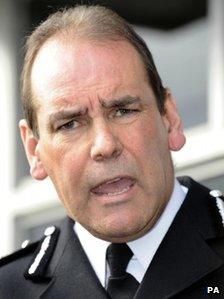Sir Norman Bettison in probe over Stephen Lawrence family claims
- Published

Sir Norman Bettison has been referred to the IPCC
Ex-police chief Sir Norman Bettison has been referred to the Independent Police Complaints Commission over fears officers tried to discredit the family of Stephen Lawrence.
The police watchdog has been asked to investigate concerns he tried to influence the way a key witness gave evidence to the Macpherson Inquiry.
The referral was made by West Yorkshire Police and Crime Commissioner Mark Burns-Williamson.
He said he had "significant concerns".
"I have become aware of three documents following a thorough search requested by West Yorkshire Police Chief Constable Mark Gilmore," he said.
'Face the consequences'
"These documents raise significant concerns over the role of Sir Norman Bettison at the time he was Assistant Chief Constable of West Yorkshire Police in 1998 in commissioning a report to be prepared in the respect of a key witness appearing before the Macpherson Inquiry.
"This may suggest an attempt to intervene in the course of a public inquiry and influence the manner in which the testimony of a witness, who was due to present evidence before it, was received.
"I have today referred this to the Independent Police Complaints Commission."
Mr Burns-Williamson said the matter needed to be "thoroughly investigated" and, if wrongdoing was found, "those responsible must face the consequences".
A spokesman for the IPCC confirmed it had received the referral and said it would now assess the information before making a decision on whether to begin an investigation.
The Macpherson Inquiry, external was set up in 1998 to look at into the Metropolitan Police's investigation of the murder of 18-year-old Stephen Lawrence in Eltham, south London, in April 1993.
It led to accusations of institutional racism being levelled at the force and uncovered failings in how the crime was investigated.
Hearings were held around the country where local race relations organisations, victim support groups, probation services and police gave evidence on problems with race crime and how they were tackled.
West Yorkshire Police said the three documents it had discovered identified that a man, due to give evidence to the inquiry when it sat in Bradford, was the subject of a police report.
'Cooperate fully'
It said the documents had given rise to concerns about the "motivation for the report" and its "appropriateness".
Mr Gilmore, who took over from Sir Norman in April after his predecessor had resigned six months earlier, said: "West Yorkshire Police will cooperate fully with the IPCC and assist in any way we can to get to the truth."
At the time Sir Norman stepped down he was the subject of two IPCC investigations related to the Hillsborough tragedy, when 96 football fans died.
At the time of the disaster on 15 April 1989, he was a South Yorkshire Police inspector who attended the match as a spectator and later took part in an internal inquiry.
It is alleged he provided misleading information to the inquiry.
Sir Norman was also under investigation over claims he "attempted to influence the decision-making process of the West Yorkshire Police Authority" in connection with their decision to refer the matter to the IPCC.
In March the IPCC said, in relation to the second allegation, Sir Norman would have had a "case to answer for gross misconduct" if he was a serving officer.
- Published27 June 2013
- Published24 June 2013
- Published28 March 2013